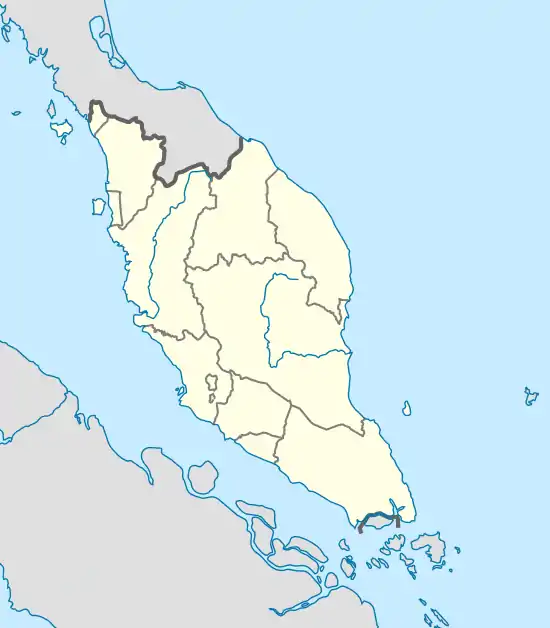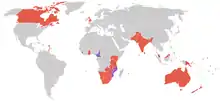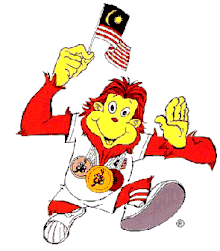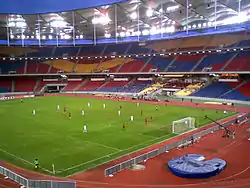1998 Commonwealth Games
The 1998 Commonwealth Games (Malay: Sukan Komanwel 1998), officially known as the XVI Commonwealth Games (Malay: Sukan Komanwel ke-16), was a multi-sport event held in Kuala Lumpur, Malaysia. This edition is marked by several unprecedented facts in the history of the event. The 1998 games were the first held in an Asian country and the last Commonwealth Games of the 20th century. This was also the first time the games took place in a nation with a head of state other than the Head of the Commonwealth, and the first time the games were held in a country whose majority of the population did not have English as the first language. For the first time ever, the games included team sports. The other bid from the 1998 games came from Adelaide in Australia.[1] Malaysia was the eighth nation to host the Commonwealth Games after Canada, England, Australia, New Zealand, Wales, Jamaica and Scotland. Around 3638 athletes from 69 Commonwealth member nations participated at the games which featured 214 events in 15 sports with 34 of them collected medals.
 | |
| Host city | Kuala Lumpur, Malaysia |
|---|---|
| Motto | Bersama-sama Gemilangkannya (Together we'll glorify this moment) |
| Nations participating | 69 |
| Athletes participating | 3638 |
| Events | 214 in 15 sports |
| Opening ceremony | 11 September |
| Closing ceremony | 21 September |
| Officially opened by | Tuanku Jaafar King of Malaysia |
| Officially closed by | Elizabeth II |
| Athlete's Oath | Shalin Zulkifli |
| Queen's Baton Final Runner | Koh Eng Tong |
| Anthem | Forever as One (Roy) |
| Main venue | Bukit Jalil National Stadium |
Host selection
Kuala Lumpur was selected to stage the games at the General Assembly of the Commonwealth Games Federation in Barcelona, Spain during the 1992 Summer Olympics.[1]
| 1998 Commonwealth Games Bidding Results | |||||||
|---|---|---|---|---|---|---|---|
| City | CGA Name | Votes | |||||
| Kuala Lumpur | 40 | ||||||
| Adelaide | 25 | ||||||
Preparation
Venues

- National Stadium, Bukit Jalil – Opening/Closing Ceremony, Athletics (Track and field)
- Putra Indoor Stadium – Gymnastics
- National Aquatic Centre – Aquatics (Swimming, Diving, Synchronised swimming)
- National Hockey Stadium – Hockey (men)
- National Squash Centre – Squash
- Juara Stadium – Netball
- National Lawn Bowls Centre – Lawn Bowls
- Other venues
- Merdeka Square, Kuala Lumpur – Athletics (Marathon)
- Titiwangsa Lake Gardens – Athletics (Race walking (outdoor))
- Kuala Lumpur Badminton Stadium – Badminton
- Cheras Veledrome, Kuala Lumpur – Cycling (Track)
- Royal Military College, Sungai Besi – Cricket (Heats)
- Victoria Institution – Cricket (Heats)
- Tenaga National Sports Complex – Cricket (Heats)
- Kelab Aman, Ampang – Cricket (Heats, Bronze playoff)
- Kuala Lumpur Hockey Stadium, Pantai – Hockey (Women)
- Mines Convention Centre – Weightlifting
- Shah Alam Circuit – Cycling (Road)
- Malawati Stadium, Shah Alam – Boxing
- Sunway Pyramid, Subang Jaya – Bowling
- Petaling Jaya Stadium, Petaling Jaya – Rugby
- Selangor State Development Corporation (PKNS) Kelana Jaya – Cricket (Finals)
- Rubber Research Institute, Sungai Buloh – Cricket (Heats)
- Langkawi International Shooting Range (Lisram) – Shooting
The athletes' village (Vista Kommanwel) is located beside the National Sports Complex in Bukit Jalil. It consists of three tower blocks of 30 storeys and six hillside blocks of 19 storeys with 1,300 condominiums and an International Shopping Zone.
Opening ceremony
The 16th Commonwealth Games opening ceremony took place on 11 September 1998 at 20:00 MST (UTC+08:00). During the ceremony, approximately 4,840 Soka Gakkai volunteers displayed coloured flip cards which depicted sporting images, flags of the Commonwealth nations and messages that heralded the first games in Asia in the 68 years since their inception. The ceremony was preceded by a pre-show concert by Malaysian pop singers such as Norzila Binti Haji Aminuddin, Shahrul Anuar Zain, Siti Roziana Binti Zain, Shaheila binti Abdul Majid, Amy Mastura Binti Suhaimi, Ning Baizura binti Sheikh Hamzah and Siti Nurhaliza Binti Tarudin, performance by local comedian Harith Iskander and 16 paratroopers who descended down the stadium.
The ceremony began with the arrival of dignitaries including the Chairman of Commonwealth Games Federation Mr Michael Fennel, Prince Edward, Sultan of Brunei Hassanal Bolkiah, Prime Minister Dato Seri, Dr Mahathir Mohamad, the Yang Dipertuan Agong and Malaysian minister of Youth and Sports Tan Sri Muhyiddin Yassin. This was followed by the parade of nations — 69 participating nations, led by mascot Wira and previous games' mascots (Canada being the first country to come into the stadium as host country of the previous games, and Malaysia entering last as hosts).The Singaporean delegation was jeered by the crowd during the parade of nations.[4] Then came a performance about a Malaysian rainforest by 2,000 school children who dressed as birds, bees and flowers.[5]
After the performance, the Queen's message was delivered in the ceremonial baton, which had begun the final stages of its journey on the back of an elephant. 1978 Commonwealth Games badminton gold medal winner Sylvia Ng took the last lap with the baton and handed it off to Koh Eng Tong, a weightlifter who won a gold medal in weightlifting for Malaya in the 1950 British Empire Games, to take the final few feet to Prince Edward.
Contrary to tradition, the games were officially opened by the Malaysian head of state, Yang di Pertuan Agong Tuanku Jaafar by striking the gong three times. A burst of fireworks and blurring of the giant bunga raya and a 16-gun salute which represents 1998 Commonwealth Games being the 16th-edition games, signified the beginning of the games.[6][7][8] The Commonwealth Games flag was then brought into the stadium raised to the theme song of the Games Forever As One written by local composer, Goh Boon Hoe. Malaysian bowler Shalin Zulkifli later take the oath on behalf of the athletes.
The ceremony concluded with a 40-minute performance, titled "Aur di Tebing" (Bamboo at the riverside) with the theme 'Unity towards Progress', which was conveyed through dance, music, and intricate human graphics. 2,000 performers swirled and danced carrying trays of bunga emas (golden flowers) on their heads during a mass silat display. The show told the Malaysian history from ancient Malacca to the present development in Malaysia, its political, economical and technological achievements as well as its people's vision of peace, prosperity and unity and lifestyle.[5]
Closing ceremony
The closing ceremony took place on 21 September 1998 at 20:00 MST (UTC+08:00). The attendees of the ceremony included Raja Permaisuri Agong, Tuanku Najihah, Prince Philip, Duke of Edinburgh, Prime Minister Mahathir Mohamad and his wife, Commonwealth Games Federation President (CGF),Sir Michael Fennel; Commonwealth of Nations Secretary-general Chief Emeka Anyaoku; Minister of youth and sports Tan Sri Muhyiddin Yassin and Executive Chairman of Sukom Ninety Eight Berhad, Tan Sri Hashim Mohd. Ali.
The ceremony began with Queen Elizabeth and King Ja'afar's arrival in a limousine, for inspection of guards of honour of the Royal Malay Regiment. The British national anthem God Save The Queen was played followed by Malaysia's national anthem Negaraku. This was followed by a 3-part cultural performance led by a band performance by 400 school students from Johor, Negeri Sembilan, Selangor and Kuala Lumpur followed by an upbeat song performance from local artist Jay Jay.
As the protocol says, a 15-minute presentation from Manchester, England, host city of the 2002 edition, was staged which included songs, videos and a live performance from the group New Order at the Albert Square, also the main moment was when message from British Prime Minister Tony Blair was delivered.
A contemporary farewell dance performance by local artists, featured Siti Nurhaliza and Noraniza Idris concludes the cultural performance. Soon afterwards, all the participants, flag-bearers and the volunteers march into the main ground of the stadium and Olympic council of Malaysia president Tan Sri Hamzah Abu Samah later declared the returning of the flags of all the participating nations.
Then the protocol was resumed and the 69 Commonwealth Games Associations flagbearers positioned themselves in a rostrum and the Commonwealth Games flag was lowered by the Malaysian armed forces. Next, the flag of the Commonwealth Games Federation is lowered by Malaysian Armed Forces personnel to the games theme song, Forever as one and is paraded around the stadium before being folded and handed over to the mayor of Kuala Lumpur, Tan Sri Kamarulzaman Sharif, who handed it over to the president of the Commonwealth Games Federation, Jamaican Michael Fennel.Fennel handed the flag to the Chief Citizen of Manchester city, Gordon Conquest. Following, the official speeches were delivered and Queen Elisabeth was invited to declare the Games closed. In a new protocol step, the Queen has withdrew from the stadium alongside the King of Malaysia and other authorities, after the guard of honour march song has played, followed by Auld Lang Syne. The prime minister of Malaysia, Mahathir Mohamad, later made an announcement to declare 28 September 1998 as a national public holiday to commemorate the nation's success in hosting the games. The ceremony concluded with a concert performed by Six Commonwealth Top Singers representing the six regions of the Commonwealth Federation and local artists.[9][10][11]
Participating teams

Sixty-nine teams were represented at the 1998 Games. The only absent country was Nigeria who suspended from Commonwealth due to the tyrannical dictatorship of Sani Abacha who had died earlier that year.[12]
| Participating Commonwealth Games Associations |
|---|
|
| Debuting Commonwealth countries and territories |
|
Calendar
| OC | Opening ceremony | ● | Event competitions | 1 | Gold medal events | CC | Closing ceremony |
| September | 7th Mon |
8th Tue |
9th Wed |
10th Thu |
11th Fri |
12th Sat |
13th Sun |
14th Mon |
15th Tue |
16th Wed |
17th Thu |
18th Fri |
19th Sat |
20th Sun |
21st Mon |
Events | |
|---|---|---|---|---|---|---|---|---|---|---|---|---|---|---|---|---|---|
| Ceremonies | OC | CC | N/A | ||||||||||||||
| Aquatics | 2 | 2 | 2 | 6 | |||||||||||||
| 5 | 5 | 5 | 5 | 6 | 6 | 32 | |||||||||||
| ● | ● | 1 | 1 | 2 | |||||||||||||
| 2 | 8 | 7 | 11 | 7 | 11 | 46 | |||||||||||
| ● | ● | ● | ● | 2 | ● | ● | ● | ● | 3 | 2 | 7 | ||||||
| 2 | 1 | ● | 2 | 5 | |||||||||||||
| ● | ● | ● | ● | ● | ● | ● | 12 | 12 | |||||||||
| ● | ● | ● | ● | ● | ● | ● | ● | ● | 1 | 1 | |||||||
| 1 | 1 | ● | 2 | 1 | 3 | 2 | 3 | 13 | |||||||||
| 1 | 1 | 2 | 10 | 1 | 1 | 4 | 20 | ||||||||||
| ● | ● | ● | ● | ● | ● | ● | ● | ● | 2 | 2 | |||||||
| ● | ● | ● | ● | 1 | 1 | 1 | 1 | 2 | 6 | ||||||||
| ● | ● | ● | ● | ● | ● | 1 | 1 | ||||||||||
| ● | ● | 1 | 1 | ||||||||||||||
| ● | ● | ● | ● | 5 | 4 | 4 | 2 | 4 | 5 | 3 | 4 | 31 | |||||
| ● | ● | ● | ● | ● | 2 | ● | ● | ● | 3 | 5 | |||||||
| 6 | 6 | 6 | 6 | 24 | |||||||||||||
| Daily medal events | 7 | 14 | 16 | 12 | 31 | 26 | 24 | 27 | 39 | 18 | 214 | ||||||
| Cumulative total | 7 | 21 | 37 | 49 | 80 | 106 | 130 | 157 | 196 | 214 | |||||||
| September | 7th Mon |
8th Tue |
9th Wed |
10th Thu |
11th Fri |
12th Sat |
13th Sun |
14th Mon |
15th Tue |
16th Wed |
17th Thu |
18th Fri |
19th Sat |
20th Sun |
21st Mon |
Events | |
Sports overview
The host nation achieved its best-ever haul of ten gold medals which has since been surpassed by its achievement in the 2010 Commonwealth Games, where Malaysia won twelve gold medals.
The 16th Commonwealth Games host newly introduced team sports of cricket, field hockey, netball and rugby sevens and individuals sports of ten-pin bowling and squash, while of athletics, badminton, boxing, cycling, gymnastics, lawn bowls, shooting, swimming and weightlifting to make a total of 15 sports contested.
In front of 20,000 fans at the Petaling Jaya Stadium, rugby sevens in particular were an enormous success with New Zealand collecting its 100th Commonwealth Games medal with a 21–12 win over plucky Fiji, (the reigning world champions). Man of the match was the giant Jonah Lomu who had worked tirelessly during the 10-minutes-each-way final. Led by veteran star David Campese, Australia took the bronze beating Samoa 33–12.
In the squash event many had anticipated a close match between Michelle Martin and Sarah Fitz-Gerald who had both comfortably won their respective semi-finals. Fitz-Gerald had won the previous two years' World Opens and Martin the three prior to that and so it was with some surprise to many that Martin took the gold in three straight sets 9–0, 9–6, 9–5. Fitz-Gerald did avenge this defeat in the final of the world championship later that year, in what many people regard as the greatest women's final ever, coming back from 8–2 down in the fifth to retain her title.
Martin also teamed up with Craig Rowland to take the Commonwealth mixed doubles gold.
Erika-Leigh Stirton took five of the six available gold medals in the rhythmic gymnastics only being beaten into second place in the team event in the hosts took gold.[13][14]
Medal table
Only the top ten successful nations are displayed here.
The ranking in this table is consistent with International Olympic Committee convention in its published medal tables. By default, the table is ordered by the number of gold medals the athletes from a nation have won (in this context, a "nation" is an entity represented by a Commonwealth Games Association). The number of silver medals is taken into consideration next and then the number of bronze medals. If nations are still tied, equal ranking is given and they are listed alphabetically by their three-letter country code.[15][16]
- Key
* Host nation (Malaysia)
| Rank | CGA | Gold | Silver | Bronze | Total |
|---|---|---|---|---|---|
| 1 | 80 | 61 | 58 | 199 | |
| 2 | 36 | 47 | 53 | 136 | |
| 3 | 30 | 31 | 38 | 99 | |
| 4 | 10 | 14 | 12 | 36 | |
| 5 | 9 | 11 | 14 | 34 | |
| 6 | 8 | 7 | 20 | 35 | |
| 7 | 8 | 5 | 4 | 17 | |
| 8 | 7 | 10 | 8 | 25 | |
| 9 | 4 | 2 | 0 | 6 | |
| 10 | 3 | 4 | 8 | 15 | |
| 11 | 3 | 2 | 7 | 12 | |
| 12 | 3 | 0 | 0 | 3 | |
| 13 | 2 | 1 | 2 | 5 | |
| 14 | 2 | 0 | 3 | 5 | |
| 15 | 1 | 1 | 3 | 5 | |
| 16 | 1 | 1 | 2 | 4 | |
| 17 | 1 | 1 | 1 | 3 | |
| 1 | 1 | 1 | 3 | ||
| 1 | 1 | 1 | 3 | ||
| 20 | 1 | 1 | 0 | 2 | |
| 1 | 1 | 0 | 2 | ||
| 22 | 1 | 0 | 2 | 3 | |
| 23 | 1 | 0 | 0 | 1 | |
| 24 | 0 | 3 | 3 | 6 | |
| 25 | 0 | 2 | 1 | 3 | |
| 26 | 0 | 2 | 0 | 2 | |
| 27 | 0 | 1 | 1 | 2 | |
| 28 | 0 | 1 | 0 | 1 | |
| 0 | 1 | 0 | 1 | ||
| 0 | 1 | 0 | 1 | ||
| 0 | 1 | 0 | 1 | ||
| 32 | 0 | 0 | 1 | 1 | |
| 0 | 0 | 1 | 1 | ||
| 0 | 0 | 1 | 1 | ||
| Totals (34 CGAs) | 214 | 214 | 245 | 673 | |
Marketing
Logo

The logo of the 1998 Commonwealth Games is an image of the national flower of Malaysia, the hibiscus (the bunga raya), the first games logo to introduce the colour yellow. (All previous logos had been red, white and blue to reflect the colours of the British Union Flag.) The red, blue, white and yellow colours represents the colours of the Malaysian national flag and Malaysia as a confident, young, dynamic nation. The yellow pollens represent the six regions of the world that includes the 68 Commonwealth member nations.
Mascot
The official mascot of the 1998 Commonwealth Games is an orangutan named Wira (Malay for "warrior" or "hero"). It is said that the orangutan is the largest and probably the most intelligent primate in Asia which lives in the tropical rainforests of Malaysia. The adoption of orangutan as a games' mascot is to represent the friendly personality of Malaysia as the games' host as well as the charm, intelligence, and sporting ability of the participating athletes.[17]
Sponsors
A total of 55 companies and organisations sponsored the games, including Malaysian state-owned enterprises.
- Astro
- Bank Bumiputra Berhad
- Canon Inc.
- DRB-HICOM
- Leopex Sporting Goods
- Kodak
- Malaysia Airlines
- MasterCard
- Maybank
- Pensonic Group
- Nestlé
- PepsiCo
- Percetakan Nasional Malaysia Berhad
- Petronas
- Siemens
- Siemens Nixdorf Informationssysteme
- Faber-Castell
- Aramas Utama Holdings
- Extol Corporation
- Clipsal
- Electcoms
- Goldtronics
- Grace Distribution
- Permanis
- Macroworld
- Microsoft
- NetCard Corporation
- P.K. Electronics
- Royal Selangor
- Perodua
- Permodalan Nasional Berhad
- Selvex
- Sema Group
- Teknologi Ikram
- Unilever
- Konsortium Perkapalan Berhad
- Pos Malaysia
- Telekom Malaysia
- TH Alliance Asia Pacific
- Genting Group
- Sime Darby
- Antah Group
- Kuala Lumpur Stock Exchange
- Malaysian Industrial Development Finance Berhad
- Colgate-Palmolive
- Island & Peninsular Berhad
- Sungei Way Group
- Ajinomoto
- Tenaga Nasional
- Chiyoda Corporation
- BP
- Tourism Publications Corporation
- IOI Group
- Golden Hope
Medals by event
Aquatics
Athletics
Badminton
Boxing
Cricket
| Event | Gold | Silver | Bronze |
|---|---|---|---|
| Men's cricket |
Track cycling
Road bicycle racing
| Event | Gold | Silver | Bronze |
|---|---|---|---|
| Women's 28 km individual time trial | Anna Wilson |
Linda Jackson |
Kathy Watt |
| Men's 42 km individual time trial | Eric Wohlberg |
Stuart O'Grady |
David George |
| Women's 92 km road race | Lyne Bessette |
Susy Pryde |
Anna Wilson |
| Men's 184 km road race | Jay Sweet |
Rosli Effandy |
Eric Wohlberg |
Gymnastics
(Field) Hockey
Lawn bowls
Netball
Rugby sevens
Shooting
| Event | Gold | Silver | Bronze |
|---|---|---|---|
| Men's air pistol individual | Mick Gault |
Jaspal Rana |
Greg Yelavich |
| Women's air pistol individual | Annemarie Forder |
Christine Trefry |
Tania Corrigan |
| Men's air pistol team | Nick Baxter and Mick Gault |
Jaspal Rana and Satendra Kumar |
John Rochon and Jean-Pierre Huot |
| Women's air pistol pairs | Annemarie Forder and Christine Trefry |
Tania Corrigan and Jocelyn Lees |
Kamisah Abdul Jalal and Suriani Othman |
| Men's air rifle individual | Chris Hector |
Mohd Emran Zakaria |
Zlatko Beneta |
| Women's air rifle individual | Nurul Huda Baharin |
Sharon Bowes |
Louise Minett |
| Men's air rifle team | Chris Hector and Nigel Wallace |
Abdul Mutalib Abdul Razak and Mohammed Emran Zakaria |
David Rattray and Robin Law |
| Women's air rifle pairs | Christina Ashcroft and Sharon Bowes |
Belinda Muehlberg and Noemi Rostas |
Louise Minett and Becky Spicer |
| Men's 25 m centre-fire pistol individual | Jaspal Rana |
Allan McDonald |
John Rochon |
| Men's 25 m centre-fire pistol pairs | Jaspal Rana and Ashok Pandit |
John Rochon and Metodi Igorov |
Mike Giustiniano and Bruce Quick |
| Men's Clay Pigeon trap individual | Michael Diamond |
Ian Peel |
Desmond Coe |
| Men's free pistol individual | Mick Gault |
Francois Van Tonder |
Bruce Quick |
| Men's free pistol pairs | Nick Baxter and Mick Gault |
David Moore and Bruce Quick |
John Rochon and Jean-Pierre Huot |
| Fullbore rifle Queens prize open pair | David Calvert and Martin Millar |
James Paton and Alain Marion |
David Davies and Christopher Hockley |
| Fullbore rifle Queens prize open individual | James Paton |
Zainal Abidin Md Zain |
Andrew Luckman |
| Men's Olympic trap individual | Michael Diamond |
Ian Peel |
Desmond Coe |
| Men's Olympic trap team | Mansher Singh and Manavjit Singh |
Michael Diamond and Ben Kelley |
Bob Borsley and Ian Peel |
| Men's 25 m rapid fire pistol individual | Metodi Igorov |
Allan McDonald |
Bhanwar Dhaka |
| Men's 25 m rapid fire pistol pairs | Mike Giustiniano and Pat Murray |
Jason Wakeling and Alan Earle |
Allan McDonald and André van Emmenis |
| Men's skeet individual | Desmond Davies |
Joe Trinci |
David Cunningham |
| Men's skeet pairs | Costas Stratis and Antonis Nicolaides |
Andy Austin and Drew Harvey |
Douglas McCutcheon and Joe Trinci |
| Men's smallbore rifle three positions individual | Timothy Lowndes |
Wayne Sorensen |
Kenneth Parr |
| Men's free rifle three positions pairs | Michael Dion and Wayne Sorensen |
Les Imgrund and Tim Lowndes |
Chris Hector and Kenneth Parr |
| Men's free rifle prone individual | Stephen Petterson |
David Moore |
Gavin van Rhyn |
| Men's free rifle prone pairs | Gavin van Rhyn and Michael Thiele |
Philip Scanlan and Neil Day |
Tim Lowndes and Warren Potent |
| Women's free rifle prone individual | Roopa Unnikrishnan |
Carrie Quigley |
Sally Johnston |
| Women's free rifle prone pairs | Carrie Quigley and Kim Frazer |
Christina Ashcroft and Maureen Spinney |
Susan Bell and Shirley McIntosh |
| Women's smallbore sport rifle three positions individual | Susan McCready |
Sharon Bowes |
Roslina Bakar |
| Women's smallbore sport rifle Three positions pairs | Sharon Bowes and Christina Ashcroft |
Val Martin and Donna Potgieter |
Shirley McIntosh and Janis Thomson |
| Women's sport pistol individual | Christine Trefry |
Bibiana Ng Pei Chin |
Kim Eagles |
| Women's sport pistol pairs | Christine Trefry and Annette Woodward |
Tania Corrigan and Jocelyn Lees |
Bibiana Ng Pei Chin and Norsita Mahmud |
Squash
Bowling
| Event | Gold | Silver | Bronze |
|---|---|---|---|
| Men's singles | Kenny Ang |
Bill Rowe |
Warren Rennox |
| Women's singles | Cara Honeychurch |
Maxine Nable |
Lai Kin Ngoh |
| Men's doubles | Kenny Ang and Ben Heng |
Antoine Jones and Conrad Lister |
Michael Muir and Frank Ryan |
| Women's doubles | Cara Honeychurch and Maxine Nable |
Lai Kin Ngoh and Shalin Zulkifli |
Pauline Buck and Gemma Burden |
| Mixed doubles | Frank Ryan and Cara Honeychurch |
Richard Hood and Pauline Buck |
Bill Rowe and Jane Amlinger |
Weightlifting
| Event | Gold | Silver | Bronze |
|---|---|---|---|
| Men's 56 kg snatch | Mehmey Yagci |
Arumugam K. Pandian |
Matin Guntali |
| Men's 56 kg clean and jerk | Dharmaraj Wilson |
Arumugam K. Pandian |
Matin Guntali |
| Men's 56 kg combined | Arumugam K. Pandian |
Dharmaraj Wilson |
Matin Guntali |
| Men's 62 kg snatch | Marcus Stephen |
Yurik Sarkisyan |
Ganapathy Gnanasekar |
| Men's 62 kg clean and jerk | Marcus Stephen |
Yurik Sarkisyan |
Murugesan Arun |
| Men's 62 kg combined | Marcus Stephen |
Yurik Sarkisyan |
Murugesan Arun |
| Men's 69 kg snatch | Sebastien Groulx |
Stewart Cruickshank |
Tony Morgan |
| Men's 69 kg clean and jerk | Muhamad Hidayat Hamidon |
Sebastien Groulx |
G. Vadivelu |
| Men's 69 kg combined | Sebastien Groulx |
Muhamad Hidayat Hamidon |
Sandeep Kumar |
| Men's 77 kg snatch | Satheesha Rai |
Dave Morgan |
Damian Brown |
| Men's 77 kg clean and jerk | Damian Brown |
Satheesha Rai |
Alain Bilodeau |
| Men's 77 kg combined | Damian Brown |
Satheesha Rai |
Alain Bilodeau |
| Men's 85 kg snatch | Stephen Ward |
Leon Griffin |
David Matam Matam |
| Men's 85 kg clean and jerk | Leon Griffin |
Stephen Ward |
David Matam Matam |
| Men's 85 kg combined | Leon Griffin |
Stephen Ward |
David Matam Matam |
| Men's 94 kg snatch | Kiril Kounev |
Anthony Arthur |
Simon Heffernan |
| Men's 94 kg clean and jerk | Kiril Kounev |
Andy Callard |
Simon Heffernan |
| Men's 94 kg combined | Kiril Kounev |
Andy Callard |
Simon Heffernan |
| Men's 105 kg snatch | Akos Sandor |
Tommy Yule |
Nigel Avery |
| Men's 105 kg clean and jerk | Akos Sandor |
Tommy Yule |
Karl Grant |
| Men's 105 kg combined | Akos Sandor |
Tommy Yule |
Nigel Avery |
| Men's 105+ kg snatch | Darren Liddel |
Giles Greenwood |
Christopher Rae |
| Men's 105+ kg clean and jerk | Darren Liddel |
Jean Bilong |
Christopher Rae |
| Men's 105+ kg combined | Darren Liddel |
Christopher Rae |
Giles Greenwood |
See also
References
- Roper, Alexander. "The Bidding Games: The Games Behind Malaysia's Commonwealth Games". Academia.edu. Retrieved 30 September 2013.
- "Schedule".
- "Sports".
- Jones, Terry (12 September 1998). "Opening ceremonies were as good as they get". Edmonton Sun. Retrieved 18 August 2016.
- "Opening, closing programmes". Archived from the original on 16 October 2016.
- "1998 Commonwealth Games gloriously officiated". Archived from the original on 27 January 2018. Retrieved 27 January 2018.
- "Soka Gakkai Malaysia XVI Commonwealth Games".
- "Glittering Ceremony Marks Commonwealth Games Opening". Archived from the original on 5 April 2018. Retrieved 4 April 2018.
- "1998 Commonwealth Games" (PDF).
- "Malaysia made history 10 golds placed nation in fourth place". Archived from the original on 27 January 2018. Retrieved 27 January 2018.
- "Best Ever Commonwealth Games Comes To A Close". Archived from the original on 5 April 2018. Retrieved 4 April 2018.
- http://edition.cnn.com/WORLD/9511/nigeria/11-11/
- "Past Commonwealth Games". CGF. Archived from the original on 15 February 2013. Retrieved 3 October 2012.
- "Results". Archived from the original on 4 May 1999. Retrieved 22 February 2019.
- "Medal". Archived from the original on 22 December 2005. Retrieved 22 February 2019.
- "Games Operation". Official website.
External links
- Commonwealth Games Official Site
- Official Kuala Lumpur 98 – 16th Commonwealth Games Website
- Unofficial site
- KL 98 Games Archives
- 1998 Games nine msn (now nine.com.au) Australia coverage site
| Preceded by Victoria |
Commonwealth Games Kuala Lumpur XVI Commonwealth Games |
Succeeded by Manchester |
